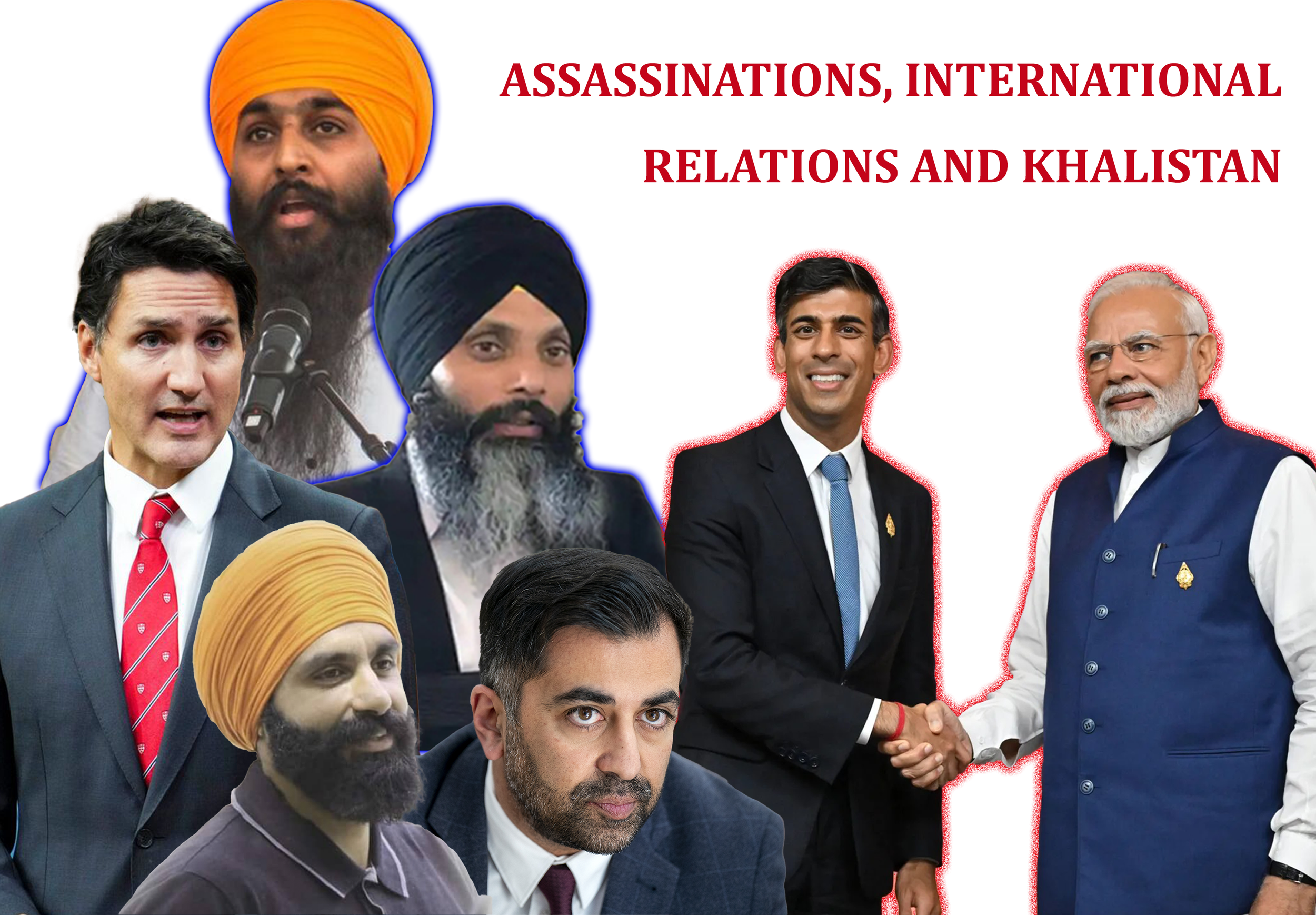May the Flag and Insignia of the Sovereign Remain Forever Free
/The Panthic Kafla (caravan: collective migration towards a common goal) has been moving under dubious guidance for far too long, it's during adversarial circumstances that we truly see how well we are being led. Our Panthic Nishaana (national objective) has always been sovereign rule and nationhood.
Whilst those that claim to represent the Sikh community advocate peaceful protest and continue to pursue the status-quo, the Indian state continues to violently disregard dissent and demonstrate it's complete intolerance for Sikh political activism in pursuit of independence. When the Panth faces adversarial circumstances the collective resistance we put up is not only a measure of our Panthic ability, our understanding of the conflict that we are engaged in is demonstrated by the methods we employ in our defence.
Our challenge as Panthic activists is to build on the foundations laid by generations of Sikh revolutionaries. As Bapu Surat Singh Ji takes inspiration from the legacy of Quami Shaheeds, and acts in full awareness of the larger context of the Panthic Nishaana, Khalistan, we too must act in a way that is true to ideals of Sikh Sangarsh, and Khalistan.
The Diaspora, Sikh youth in particular, are increasingly vocal on Panthic matters that arise in Panjab, and the responsibility lies in the hands of Sikh activists to ensure that the narrative that is presented is true to Sikh Ithihas. Far too often the Sikh position is compromised by well-meaning yet ill-informed individuals. We must be mindful, use the correct language and build using Panthic constructs, and abandon the methods and imposed ideas of our former colonial masters.
I believe the greatest injustice and deceit of colonialism (aside from the immense human tragedy), is to convince the native that their cultural constructs and their forms of governance are archaic, backwards and not relevant. The master instructs the colonised native to prefer the methods he invents and controls, further entrenching colonial constructs in the mind of the native. This results in obedience to subtly destructive alien ideas and ideological stagnation. We cannot pursue our freedom unless we use our own ideals and our own constructs, in Sikh spaces that speak to our history of resistance, our culture and language, all of which have been suppressed.
The methods we are employing today are not only flawed, they show a lack of understanding of the nature of the ideological warfare we have been engaged in since Guru Nanak refused to don the Janeou (sacred Hindu thread). We are catering Panthic activism to suit the masses, victim to capitalism, we are turning Panthic revolt in to a product that is easily digestible to the target audience and easy to market to the wider world. As activists we should be inspiring our fellow Sikh to rise to the challenges presented to the Panth, not moulding our struggle to fit slacktivists. Of course we need an element of popular support but it cannot come at the cost of the ideology of the movement itself, at the cost of our Panthic Nishaana. This idea that we need to validate our movement by explaining it in a way that is palatable to a western audience is self destructive and insults the legacy of the great individuals that have been martyred for the freedom of Panjab; as is attested by our history, the children of Panjab will be the only ones to bring back freedom to Panjab.
Nowhere is this dynamic greater demonstrated than in the advocation for the use of peaceful protest. We have managed to completely distort this concept to suit our needs and in the process, undermined it's legitimacy as an initial method of resistance. The words 'peaceful protest' assume an inherent escalation, they are employed as a means of civil disobedience to sound out a challenge to authority and warn of further action unless the issues are resolved. For Sikh peaceful protest has meant causing interruption to the state's infrastructure and economy through methods such as 'Panjab Bandh' (shutting down of businesses) and 'Rasta Roko' (blockade of transport network). When faced with the threat of police action Sikh have openly courted arrest, in 'Jail Dakho' actions (large numbers of Sikh getting arrested to fill up prisons).
Presenting flawed petitions to governments (especially in the case of the diaspora where host governments have continually made clear that they have little power and no desire to demand anything from India) without plans to thoughtfuly escalate the issue further, is not peaceful protest. Asking human rights organisations to validate our struggle and issue statements to tell us what we already know is not peaceful protest. Asking the media to cover our struggle and then standing by as they label us terrorists and write inaccurate, untrue and biased pieces is not peaceful protest. These methods are our attempt at mitigation of responsibility, we employ these methods with no plan of escalation and little coordination, they serve to make us feel good, to quantify the redundancy of our Panthic-ness. We hide behind these flawed methods. Perhaps one of the most infuriating aspects of this misuse of peaceful protest is the constant pursuit of "awareness". Awareness is an intangible thing, we have made thousands of collective tweets and posts, and we’ve seen “celebrity” endorsement and media coverage. Yet Bapu Ji is abducted at the discretion of the police and the issue lies no closer to resolution. This is an ongoing issue and Bapu Ji is symptomatic of a larger struggle. He is not the first Bapu nor the last to make a stand for the Sikh pursuit of nationhood and Azaadi.
The only people that face the consequences for our misuse of peaceful protest is us, and by “us” I mean the activists on the ground in Panjab. We wrongly believe that peaceful methods will lead to peace but they lead to violence as the state is an inherently violent entity.
We in fact create the space for violence and leave our people open to attack and abuse. There forms a void between the limits of our peaceful activism and the state desire for violence. There is a moment of silence as the state takes a measure of the resistance that is forming before it, as the state confirms that the methods employed are without power, it steps in and fills the void with violence. Our misuse of peaceful protest is contributing to this violence. The state has a monopoly on the use of force, yet this is not an idea that we subscribe to as Khalseh, our very existence challenges this idea. Have we become so afraid of war that we turn a blind eye to injustice in the name of peace? The Gurus knew that in the pursuit of nationhood, conflict with the state is inevitable, that is why they prepared us for war. Today it seems we have completely abandoned the to think about the reality of the conflict we are engaged in.
The state knows clearly that legitimate peaceful protest will ultimately revive Sikh political activism, this is why they seek to misdirect our efforts through coordinated violence and propaganda. In the diaspora Sikh media is in danger of becoming a mouth piece for the Indian state. Our media has to develop the capabilities to offer intelligent analysis, instead of presenting the propaganda of the state in raw form, completely unchallenged.
State representatives of Panjab, instead of representing the people of Panjab, regurgitate decades of anti-Sikh propaganda, concocted by the centre, and offer it up as "fresh insight". The Sikh of the diaspora needs to wake up, we are losing touch with more than 500 years of Sikh political activism. This is largely due to community leaders and misinformed activists who haven't put in any work into developing their understanding of Sikh political ideology and history, and haven't cultivated a revolutionary mind state. These reactionaries are guided by emotional, specious logic.
Our Panthic Nishaana is the pursuit of Khalistan, the foundations of which were laid in the ideology of sovereignty and the pursuit of nationhood that the Gurus nurtured for 239 years.
Alarm bells should be ringing when the narrative presented by misinformed activists and community leaders is the same as the narrative of the state. The state is trying it's utmost to contain Bapu Surat Singh's actions to 'human rights', 'rehabilitation', 'peaceful protest' and the ‘release of prisoners who have served their time'. Whilst at the same time the state continues to arrest Sikh activists en-mass, arrest and force feed Bapu Ji, label Khalistanis terrorists and suppress any talk of the larger context.
These revolutionaries are not criminals, they reject the states notions of rehabilitation, they have forsaken their human rights, facing the reality of an oppressive regime, they do not believe in peaceful protest. They have carried out revolutionary actions in an armed liberation struggle. They have been fighting every inch of the way on the road to Khalistan since their generals declared war in 1986. Their goal is victory and thus vindication. They have no desire for vindication through Indian courts. The state continues to disconnect their political struggle from the actions of Bapu Surat Singh claiming the agitation has been "high-jacked by Khalistanis", Bapu Ji is a Khalistani.
"At 83 I have seen terrible injustice heaped against by beloved Panjab and its native Sikh...we must regain our liberty" - Bapu Surat Singh.
The Indian state is incapable of giving justice to the Sikh, fundamentally justice is not theirs to give, it is ours to take as demonstrated by generations of Sikh revolutionaries. Throughout our history we have never shied away from incarceration, death sentences, police brutality or state oppression. Today we cry out for restitution, for restorative justice, we plead for clemency, this is not a reflection of the revolutionary Sikh mind (Gurmat). Our pursuit of capitalist ideals and our desire to preserve our families, our children, our wealth, our comfortable lives at all cost, has ruined our ability to revolt, to pursue our freedom and accept with courage and pride the fruits of our struggle, whether bitter or sweet. Our actions today have reduced centuries of Sikh struggle to mere stories.
This narrative of Khalistan, of our pursuit for freedom, our mission to create a truly egalitarian society that Panthic Sikh minds are presenting is being demonized by the state. They claim that Panjab will once again be "plunged into a state of civil unrest and terror". This is not a warning, this is a thinly veiled threat. What the representatives of the state are saying, bristling behind their police and paramilitary units, is this: "demand Khalistan again and we will do to you what we did before, eradicate an entire generation, use rape as a weapon, sanction extrajudicial killings, torture and black cats".
Make up your mind, either you align yourself with the narrative of the state or that of the Sikh revolutionary. If you wish to represent the Sikh Sangarsh then educate yourself so that you may be true to the Sikh Sangarsh GurSikhi, and Gurmat. If you commit to this struggle then you commit to its ideals, to its demand that it be escalated intelligently, that it be victorious.





